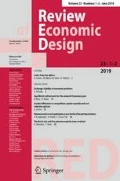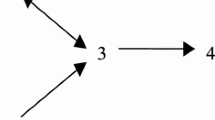Abstract. This paper analyzes the formation of directed networks where self-interested individuals choose with whom they communicate. The focus of the paper is on whether the incentives of individuals to add or sever links will lead them to form networks that are efficient from a societal viewpoint. It is shown that for some contexts, to reconcile efficiency with individual incentives, benefits must either be redistributed in ways depending on “outsiders” who do not contribute to the productive value of the network, or in ways that violate equity (i.e., anonymity). It is also shown that there are interesting contexts for which it is possible to ensure that efficient networks are individually stable via (re)distributions that are balanced across components of the network, anonymous, and independent of the connections of non-contributing outsiders.
Similar content being viewed by others
Author information
Authors and Affiliations
Rights and permissions
About this article
Cite this article
Dutta, B., Jackson, M. The stability and efficiency of directed communication networks. Rev Econ Design 5, 251–272 (2000). https://doi.org/10.1007/PL00013688
Issue Date:
DOI: https://doi.org/10.1007/PL00013688




